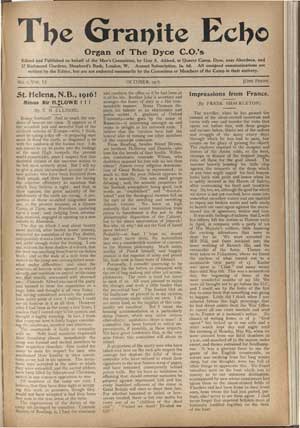The quarry, just outside Dyce village in Aberdeenshire, is a desolate and uninviting place. Run down by the start of the war but with large qualities of usable granite still remaining. The quarry owners anxious to survive begged, largely unsuccessfully, the local Tribunal not to send any more of their workers to the army. It's not clear what deal may have been made between the quarry owners and the Home Office but some less than enthusiastic conscientious objectors started to arrived in late August 1916. These COs released from English prisons on the understanding that they would be willing to perform ‘work of national importance’ were a godsend for the company not least because they represented very cheap labour.
Despite this being the Home Offices 'showcase’ camp, just two months after the first COs arrived the camp was closed. More coming soon.
|
|
Aberdeen Daily Journal September 1916
CONSCIENTIOUS OBJ ECTORS AT DYCE.
RESENTMENT IN DISTRICT
(By a Correspondent)
The district of Dyce, near Aberdeen, has had a considerable addition made to its population recently. A visitor to the village of Dyce and its vicinity on any evening of the week has his attention drawn to the number of men of apparently military age moving about and speaking in accents that proclaim them to be strangers to the neighbourhood. The speech of several of them is that of educated men, and their general behaviour that of men who have moved in circles of culture.
These young men are members of a large party, numbering about 250, of conscientious objectors to military service, who had been engaged for the past week or two in the preparation of road metal at Dyce Quarries.
The men belong to various classes and trades and professions, and it is stated that several of them held scholastic appointments at Oxford University. In the vicinity of the quarries is a large encampment of huts, in which the conscientious objectors are housed, but several of them chose to live in lodgings in the village of Dyce rather than in the huts. When not engaged at work they spend their leisure time in a variety of ways. The objectors include many who belong to such religious bodies as the Plymouth Brethren and the Quakers, while others hold Socialistic views. Frequently the men hold meetings among themselves in camp, those who hold similar ideas being drawn together to discuss the subjects of particular interest to them.
So far as I have heard, there has been no attempt at public speaking, except that an objector addressed a religious meeting one evening. It is stated, however, that some of the men have been expressing their views on political matters and on the subject of military service in private conversation with younger members of the community, and this has given rise to a good deal of adverse talk in the district. Many of the residents, indeed, feel strongly on the point. They object to an anti-military service being carried out by means of such conversations, and the opinion has been freely given expression to the steps that ought to be taken to prevent such a practice by restricting the movements of these shirkers.

| enlarge
| read
|

